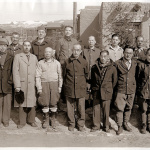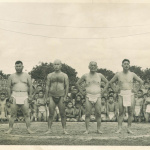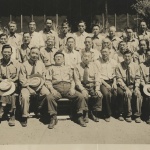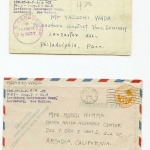Kenedy (detention facility)
| US Gov Name | Kenedy Internment Camp |
|---|---|
| Facility Type | Department of Justice Internment Camp |
| Administrative Agency | U.S. Department of Justice |
| Location | Kenedy, Texas (28.8167 lat, -97.8333 lng) |
| Date Opened | April 1, 1942 |
| Date Closed | September 1945 |
| Population Description | Held people of Japanese, German, and Italian descent from the U.S. and Latin America; also held Japanese and German prisoners of war (POWs). |
| General Description | Located 60 miles southeast of San Antonio, Texas, in Karnes County on the site of a closed Civilian Conservation Corps (CCC) camp. |
| Peak Population | 2,000 (1943-01-01) |
| National Park Service Info | |
In March 1942, the Justice Department's Immigration and Naturalization Service (INS) converted a 22-acre Civilian Conservation Corps site located in Kenedy, Texas, into an internment camp for Japanese, Germans, and Italians deported from Latin America to the United States during World War II. As a general practice, the INS sent males to the internment camp at Kenedy, married couples to the camp at Seagoville , and families with children to the camp at Crystal City . Located in Karnes County, 60 miles southeast of San Antonio, the Kenedy internment camp accommodated as many as 2,000 internees.
The first group of internees from Latin America, consisting of 456 Germans, 156 Japanese, and 14 Italians, arrived in April 1942. In May, 355 new internees arrived, mostly Germans, and in June, 253 additional internees arrived, mostly Japanese. The camp's demographics also changed as a result of repatriation. Large numbers of Germans departed in May, June, and July 1942, and in August 1943, 388 Japanese departed for Japan via the exchange vessel, the Gripsholm . By October 1943, the internee population reached perhaps its highest number, 2007: 1,168 Germans, 705 Japanese, 72 Italians, and 62 persons categorized by the INS as "miscellaneous." [1]
As the camp's population increased, internees divided into "clans" such as the Germans from Guatemala, the largest of the factions. As one camp administrator noted, "for a period of months there was a lot of agitation between the various groups." Seven distinct factions emerged but they agreed to elect at least two spokespersons. Joachim Rieper of the Haitian group, who had the backing of the Guatemala group, was one such representative. [2]
The earliest internee complaints concerned the inability to correspond freely with relatives and friends. At first, this meant communication with persons in Latin America. The INS, which employed interpreters with knowledge of the German, Spanish, and Japanese languages, censored all incoming and outgoing mail. As early as July 1942, however, 50 Japanese men requested reunification with spouses who had been detained at the Seagoville internment camp in the United States. Internees also complained about the living conditions. Specifically, the pre-fabricated "victory huts" provided poor ventilation and protection from the heat. [3]
Nevertheless, camp administrators acknowledged that they were bound to the terms of the Geneva Convention, which provided guidelines for the humane treatment of "alien enemies." The camp's "Supply Department" contracted wholesalers to provide food and clothing, and administrators kept records to demonstrate to inspectors—representatives of the protecting powers—that they abided by the terms of international law. Camp administrators also designated a "recreational area" for sports and established a hobby shop, educational center, and hospital consisting of three wards and a medical clinic.
As camp administrators and internees discovered, compliance with the Geneva Convention was subject to interpretation. The most notable confrontation occurred in late August 1942 after a "tropical hurricane" from the Gulf of Mexico destroyed parts of the camp, including the victory huts. Several internees refused to clean the debris, arguing that such work did not constitute regular "camp maintenance" under the Geneva Convention. [4] Internees who resisted were subject to disciplinary action.
To keep internees within the boundaries of the camp, the INS set up a surveillance system that included horseback patrol, guard towers, a fence, and an electrical alarm signal. Supervised by the "chief liaison officer," guards rotated from one post to another. Each tower, moreover, was equipped with a telephone. The INS reported one attempted escape. On June 15, 1943, two German internees crawled into a tree brush but were caught carrying several cans of food, bread, and first aid bandages. "Each of these men was wearing a good suit of clothing under his camp clothing," according to the report, "as well as a map which showed the entire southern part of Texas and the part of Mexico as far south as Monterrey." [5]
By October 1943, a total of 33 men had been confined to the "guard house" for sentences ranging from 3 to 22 days. In addition to attempted escape, other offenses subject to disciplinary action included: fighting, indecent exposure, bathing after hours, creating a disturbance, the making and selling of fermented beverages, theft of sugar and coffee, assault and battery, destruction of government property, and the refusal to perform work. [6] Although no evidence suggests egregious internee abuse, the fact remained that internees remained behind barbed wire in a foreign country, separated indefinitely from their families.
The INS closed the camp in September 1945, and little of it remains today. Local reports suggest that materials from the camp, including a fountain and some concrete, may still be found in the residential area that now occupies the site. [7]
For More Information
Friedman, Max Paul. Nazis and Good Neighbors: The United States Campaign against the Germans of Latin America in World War II . Cambridge: Cambridge University Press, 2003.
Gardiner, C. Harvey. Pawns in a Triangle of Hate: The Peruvian Japanese and the United States . Seattle: University of Washington Press, 1981.
Kashima, Tetsuden. Judgment Without Trial: Japanese American Imprisonment during World War II . Seattle: University of Washington Press, 2003.
Mak, Stephen. "America's Other Internment: World War II and the Making of Modern Human Rights" PhD diss., Northwestern University, 2009.
Footnotes
- ↑ Ivan Williams, "Memorandum to Jerre Mangione," 16 October 1943, File 104/025, E-276, RG85, National Archives I, Washington, D.C.
- ↑ Ibid.
- ↑ N.D. Collaer, Memorandum for Chief Patrol Inspector Hudson, 10 July 1942, File Detainees: General, Inspections, and Reports, 400/IR, E-303, RG85, NAI.
- ↑ Ivan Williams, "Memorandum to Jerre Mangione," Ibid.
- ↑ Ibid.
- ↑ Ibid.
- ↑ Jeff Burton et. al., Confinement and Ethnicity: An Overview of World War II Japanese American Relocation Sites , accessed 29 August 2012, http://www.nps.gov/parkhistory/online_books/anthropology74/ce17d.htm .
Last updated July 14, 2015, 9:47 p.m..

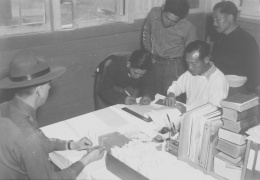 Media
Media
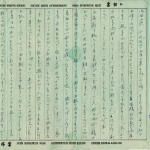
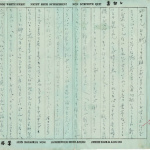
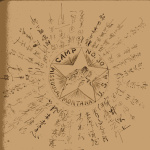
![Santa Fe, New Mexico [internees] Santa Fe, New Mexico [internees]](https://encyclopedia.densho.org/front/media/cache/47/fc/47fc7a3745ff6e6b0e850af29e08b8cd.jpg)
